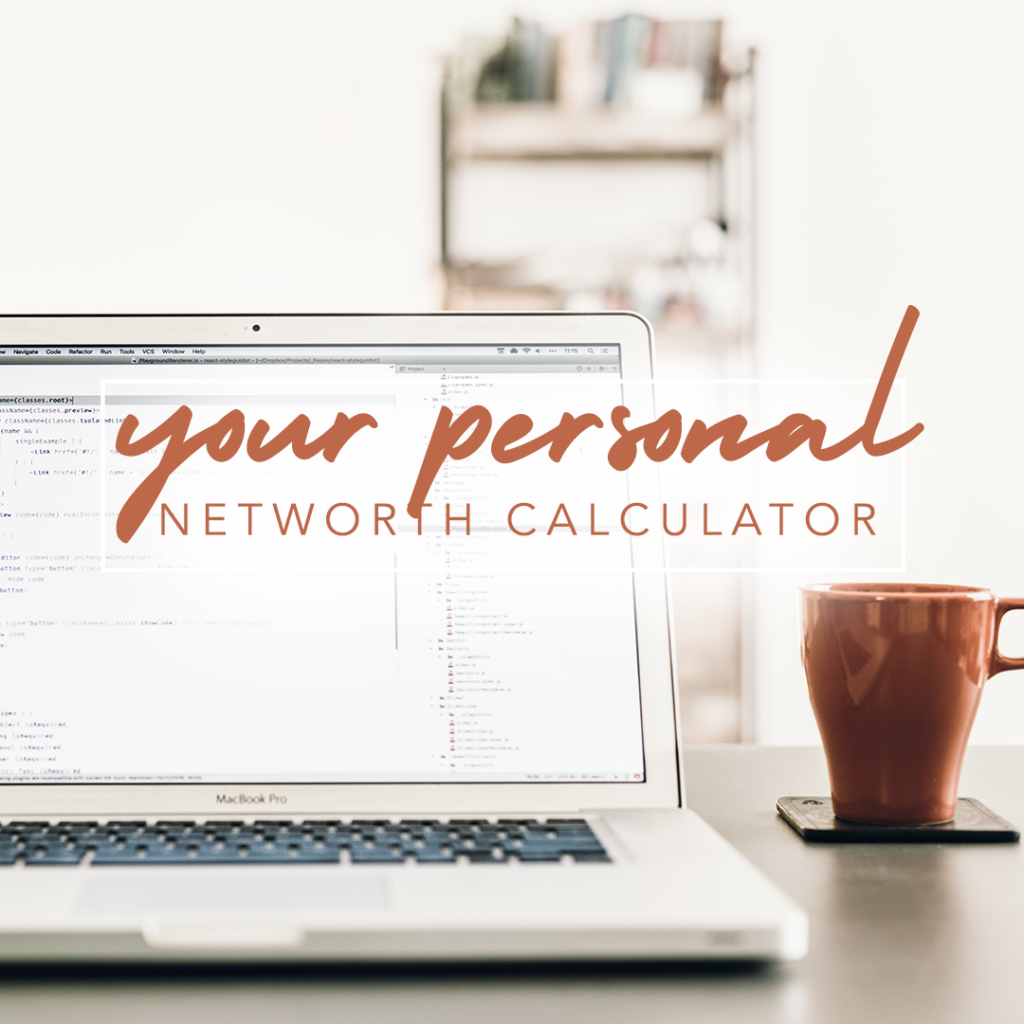Welcome to adulthood, when we go from living carefree lives to being responsible human beings with jobs and responsibilities. Part of being a responsible adult is building your net worth.
Knowing your personal net worth is part of building your financial literacy skills. You need to understand what net worth is and you need to know what yours is.

What is personal net worth?
Personal net worth is very similar to a balance sheet, except it’s how you measure your personal finances. You add up the dollar value of everything you own such as a house, property, car, investments, cash, whatever valuable assets that you have. Then you subtract everything that you owe which would include things like mortgages, car loans, credit card balances, basically any money that you owe to anyone. What is left over is your net worth.
People often feel if they are making good money, they are well off, and this is largely due to the fact that your salary is a primary source for creating wealth, but it all depends on HOW you spend that salary that determines your wealth. A high salary often does not lead to a high net worth, and I will explain how.

Let’s take two examples: Karen and Tanya.
Karen’s annual income is $150,000. Karen lives in a nice house worth about $500,000, Karen drives an Audi Q5 that she leased, where her monthly payments are $997 per month and Karen has an expensive shopping habit that costs her about $1,000 per month. Karen’s savings is $10,000. Karen owes $20,000 in credit card debt, has a line of credit where she owes $45,000 and her mortgage on her house is $395,000.
Tanya earns $80,000. Tanya lives in modest home valued at $400,000. Karen drives a used (new to her) Honda Civic that is paid off and valued at $5,000. Tanya sets automatic savings on payday of $150 biweekly, that has grown into $60,000 worth of savings. Her current credit card debt is $1,500 which she plans on paying off at the end of the month. Tanya watches where her money goes and tries not to overspend. Tanya’s mortgage is $250,000.

Net worth = assets (everything you OWN) – liabilities (everything you OWE)
Now let’s calculate their personal net worth:
| Karen: | ||||
| House | 500,000 | Credit card | -20,000 | |
| Car | 0 | Line of credit | -45,000 | |
| Savings | 10,000 | mortgage | -395,000 | |
| 510,000 | -460,000 | |||
| Net worth | $ 50,000 |
| Tanya: | ||||
| House | 400,000 | Credit card | -1,500 | |
| Car | 5,000 | Line of credit | 0 | |
| Savings | 60,000 | mortgage | -250,000 | |
| 465,000 | -251,500 | |||
| Net worth | $ 213,500 |

As you can see, Tanya is in a much better financial position than Karen, even though Karen makes more money and has higher valued assets to her name. Tanya’s approach on living a modest lifestyle and working towards savings has put her in the better financial position, which is something that Tanya should be very proud of.
It can be surprising when you look at the numbers and really understand them. This example demonstrates that although Karen makes almost twice as much money as Tanya, their spending habits are very different, and Tanya as the lower income earner has better spending habits.
Being aware of what you actually own is far more important than what you own.

Knowing what your personal net worth is important for two reasons:
1. You understand your current financial scenario
2. Personal net worth is how you measure your progress as you start building your wealth.
As you become aware of how to manage your finances, and now that you are aware of what your personal net worth means, as you continue to pay off debt and save, your personal net worth number will grow. And it’s exciting to watch that grow!!!

Here are some motivating factors to start calculating your personal net worth:
Net worth offers you the most accurate picture of your financial health. This is how much you actually own if you were to sell off everything.
Net worth tracks your financial progress. You can measure month to month or year to year and watch your progress grow.
Net worth moves the focus from income to wealth. As we can see, it really isn’t about how much you earn, but how you get your money to work for you.
Net worth helps you keep your debt level in perspective. When you know where you are, you can work at improving.
Net worth can be important in applying for a loan. Lenders look at your debt loads to determine if you are a good candidate for repayment.
The good news is that calculating your net worth is simple and straightforward, and easy to track on a periodic basis.

If you find your net worth is in the negative, this is your wake-up call. You need to start paying down that debt and getting your net worth into the positive.
Personal net worth formula
everything you OWN – everything you OWE = personal net worth
Why is it important to build your personal net worth?
If you are someone who is interested in having a financially secure future and you care about saving money and building assets, then building net worth is the right move for you. Your net worth represents the progress you are making towards paying off debt and truly owning your assets.
Negative net worth is undesirable and means that you have zero assets to your name.
Net worth is an indicator of your financial stability, so if your net worth is ranking in the negative, you are financially unstable. You owe more than what you own, and that is an undesirable state to be in, especially if you are at the midlife point in the road.

Why is building net worth more important than income?
Your income does not make you rich. Your assets make you rich because that is what you own. People who are smart with their money build net worth by investing in assets that appreciate over time. These people learn how to get their money working for them and live off the income that their money can generate over time.
What is the secret to building net worth?
Money management is key to building net worth. Follow these important money management tips:
Pay off debt
Nobody builds net worth through debt. Debt eats away at your money through the cost of borrowing and leaves you with empty pockets. The best financial advice you can ever receive is to stop carrying debt, especially expensive debt like credit card debt.
Although debt can be at times considered good debt, like a mortgage, ensure your debt ratio levels stay low and if you do have debt, that the interest rate is competitive and fair.

Live within your means
Living within your means is when you are spending less money than you bring in. Quite often people get into debt because they are doing the opposite, spending more money than what they make. That lifestyle is not sustainable and can very quickly lead to bankruptcy.
Smart investors live within their means each month and invest a certain percentage of their salary each month to ensure they are saving money. They are concerned about watching their net worth grow and gain value.
Create a financial plan
As you’ll often hear me say, a goal without a plan is just a wish. Get your goals out of your head and build a financial plan. Once you put your goals on paper, they become more real, and you can create a roadmap on how to achieve the goal.
Having a plan makes your plan actionable. And it’s smart to plan out your goals to make them achievable, because going along without direction will achieve the very thing you set out to do: nothing.
Invest in appreciable assets
The best thing you can do with your money if you want to preserve the value of it and watch your money grow at the same time is to invest your money in assets that appreciate over time. These types of assets hold their value over time and increase in worth, such as homes, property, rental property, monetary investments, and so much more.
Get your money working for you
Rich people invest their money in those types of assets and then live off the returns of their investments, never touching the principal amounts. That is the best way to preserve your wealth.
I now challenge you to calculate that net worth and make a goal of increasing that number month over month or year over year!

[…] how to increase your net worth is an important part of your financial […]